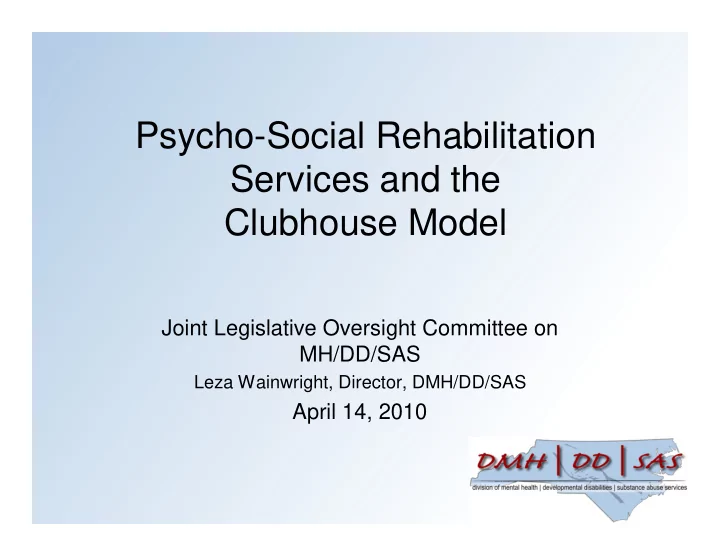

Psycho-Social Rehabilitation Services and the Clubhouse Model Joint Legislative Oversight Committee on MH/DD/SAS Leza Wainwright, Director, DMH/DD/SAS April 14, 2010
Historical Context • Idea of psychosocial rehabilitation (PSR) gained prominence through the deinstitutionalization movement of the last century • Medication and therapeutic interventions allowed individuals to successfully leave facilities, but did not adequately prepare some for community living and social interaction.
PSR Programs Developed • To address these issues, PSR programs focus on 5 main areas: – Psychiatric and physical healthcare symptom self-management – Socialization skills – family and community relationships, use of leisure time – Prevocational and educational skills – Basic living skills – personal care, meals, safety – Financial skills
Clubhouses • The clubhouse movement began with the creation of Fountain House in New York in 1944 • Focused on the same goals and activities as “traditional” PSR programs, but stress consumer ownership of the program
PSR in NC • NC has covered PSR as a Medicaid- reimbursable service for over 20 years. • Programs are licensed under rules promulgated by the Commission on MH/DD/SAS • Must operate at least 5 hours/day, 5 days/week • Current bundled rate is $2.74/15 minute unit
Numbers • Currently 85 licensed PSR programs in NC – Every LME has at least 1 program; average is approximately 4 per catchment area • 44 programs, 52%, follow the clubhouse model – All but 4 LMEs have at least one program that follows the clubhouse model • 8 NC clubhouses are member of the International Center for Clubhouse Development (ICCD) • 2,300 consumers, on average, receive PSR/clubhouse services each month
Comparison NC Psychosocial Rehabilitation Component Service Definition “Generic” Clubhouse Model ICCD Certification Requirements (Approved by CMS) Focus Recovery Same Same Goal Community Integration Same Same Eligibility Specified Axis I or II diagnosis and Open to anyone with a history of Open to anyone with a history of mental Criteria impairment in level of functioning. mental illness illness Must meet medical necessity criteria Clinical Designed to be a clinical intervention. Philosophical basis that the program Philosophical basis that the program is not /treatment Lead staff must meet Qualified is not clinical; staff do no have to clinical; staff do no have to meet any options Professional requirements. Licensed meet any professional credentials or professional credentials or experience. professional must attest to medical experience. necessity Community living (housekeeping, Same Same shopping, cooking, transportation, money management) Personal care (health care, medication Same Same self-management, grooming) Social skills building Same Same Activities Use of leisure time Same Same interventions Educational activities Same Same Pre-vocational activities Pre-vocational activities Pre-vocational activities Supported/Transitional employment Transitional employment Tiered employment – transitional optional * Not Medicaid covered employment, supported employment, independent employment Housing support not mentioned Housing support not mentioned Housing support Words for Client, consumer, patient Participant, member Participant, member, partner, colleague recipient Duration Time-limited No time limitation No time limitation Note: In order to receive Medicaid reimbursement, clubhouse models, including ICCD certified programs, must adhere to the components of the PSR service definition
Other States • National Association of State Mental Health Program Directors conducted a survey of clubhouse programs earlier this year: • 22 states responded, 20 had clubhouses • Of those 20: – 4 receive no government funding – 6 receive state-funding only for unbundled services, i.e. WRAP, case management, Peer Support – 10, including NC, receive state grant funding or bundled state rate – 12 receive no Medicaid funding – 3 receive Medicaid funding only for unbundled services, i.e. case management and Peer Support – 5, including NC, receive a bundled Medicaid rate – 4 states require ICCD membership for reimbursement
Questions?
Recommend
More recommend